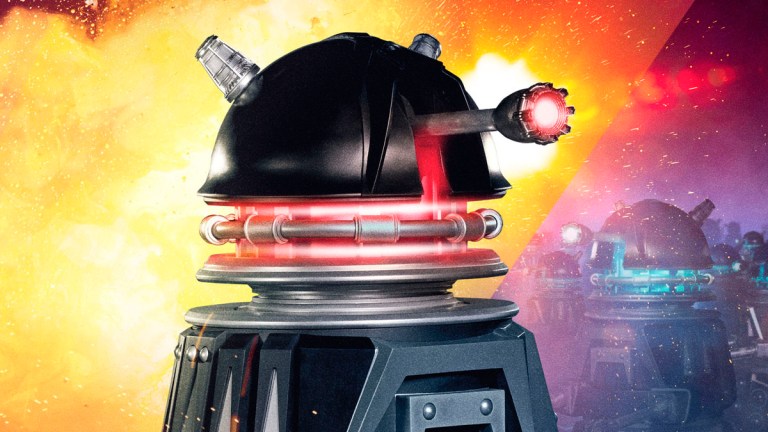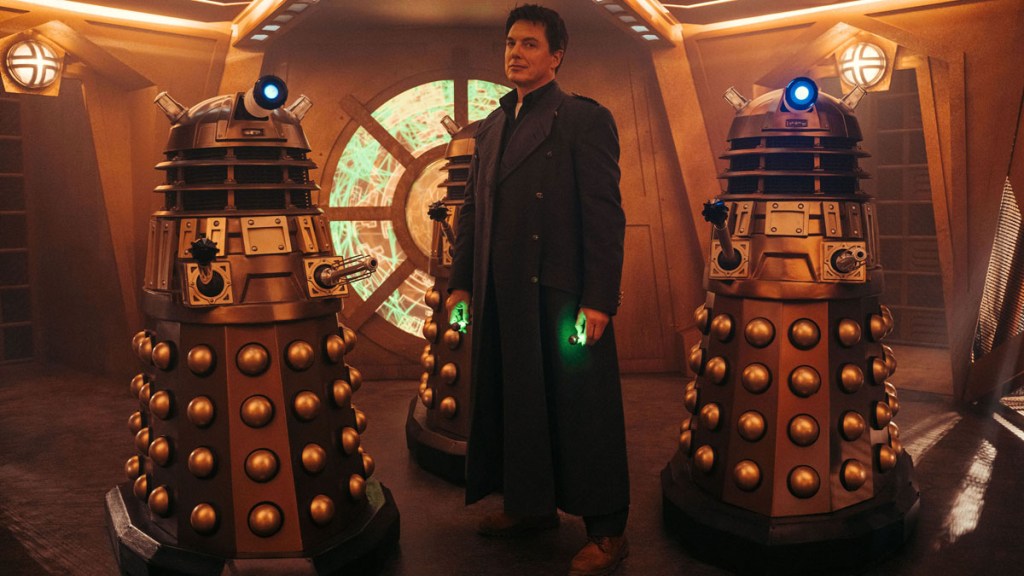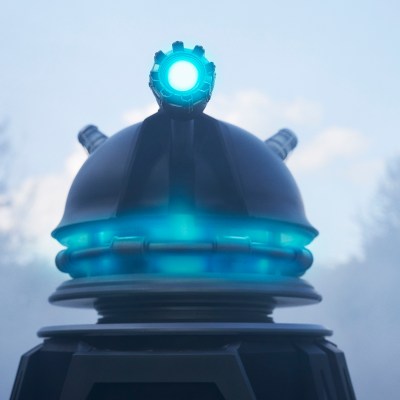Doctor Who: Revolution of the Daleks Review
There’s no auld acquaintance forgotten in this year’s festive, feature length adventure…

This Doctor Who review contains spoilers. Our spoiler-free preview is here.
It may be the start of a brand new year, but ‘Revolution of the Daleks’, an episode of Doctor Who that’ll need to tide us over for a while, is more focused on looking back and taking stock than teasing what’s ahead. As the pre-title sequence informs us, courtesy of some Big Chunky Captions that the show currently favours, not only is this episode a follow-up to the events of ‘The Timeless Child’, it’s also a sequel of sorts to the 2019 New Year’s Special, ‘Resolution’.
Things pick up a few short hours after that adventure, which saw a buried Dalek mutant hijacking a human host and eventually constructing a scrapyard casing. It’s the abandoned husk of that same travel machine that now gets carted away by an unwitting driver, a man who’s so obviously doomed from the second he signs the paperwork that you can’t help but feel sorry for him. (But then, who can’t sympathise with someone who gets through their day one cuppa at a time?)
The Dalek shell soon finds its way into a pair of grasping, familiar hands, and this is where a selection of festive snacks are likely to be flung at the screen by some of the fandom. The mastermind behind the theft turns out to be Jack Robertson – the Trump-envying, Scooby-Doo villain last seen burying toxic waste during the divisive ‘Arachnids in the UK’. Robertson, played once again by Chris Noth, hasn’t managed to realise his presidential ambitions, but his character is unapologetically the same.
This time around, Robertson is accompanied by a ruthless Defence Secretary with her eyes on Number 10. Given that this episode was almost certainly conceived back when Theresa May was still Prime Minister, it’s not hard to see the inspiration for this particular pairing. Together, their intention is to reverse-engineer the Dalek technology – which as far as they know is nothing but a very advanced robot – and mass-produce them to roam the streets.
The idea of these caricatures conspiring to build an army of alien neo-Nazis in the name of “national security” is the kind of brute-force political allegory that has proven extremely hit-or-miss in recent years. If the dastardly duo had stayed in control of the Daleks for any length of time and we’d seen Britain slowly fall into the depths of fascism while the companions looked on helplessly, the episode could have come across as both derivative and ham-fisted, particularly when compared to ‘Genesis of the Daleks’. Thankfully, the Daleks themselves are having none of it, but more on them later.
Shortly before the titular revolution, we find the companions kicking their heels back on Earth with no word from the Doctor, and no clue as to whether or not she’s even alive. Yaz is spending most of her time in the new-build TARDIS that brought them home, having gone a bit Zoom-and-Enhance as she tries desperately to concoct a rescue plan. Graham and Ryan, meanwhile, have all-but accepted the Doctor’s fate and are doing their best to look after the planet in her stead.
Alongside the exterminations and screaming that are a given whenever the Daleks are involved, this episode asks itself two questions, the first being: how do Doctor Who companions save the world without the Doctor? Ahead of transmission, the idea that Team TARDIS would need to tackle the Daleks by themselves was played up as being the meat of this story, leading to speculation that Captain Jack would step in as a sort of surrogate Doctor – he’s certainly got Dalek experience.
For better or worse, though, life without the Doctor isn’t really a question the show cares to dwell on for very long once it’s been posed, despite what the trailers might have led us to believe. It seems that what Graham, Ryan and Yaz have learned from travelling through time and space is that when someone’s threatening to take over the world, you should march right up to them, issue a few vague threats before being unceremoniously arrested, then go home again and sulk. Graham grumbles that without a sonic screwdriver or some psychic paper they can’t follow in the Doctor’s footsteps, but given how often the show teaches us that the Doctor isn’t defined by her gadgets, their half-hearted attempt to confront Robertson and save the day still comes across as a bit of a damp squib.

Luckily for the human race, it doesn’t take too long before the Doctor’s broken out of space-prison. Not from our perspective, anyway – as far as Thirteen’s concerned, she spends a good few decades in the company of some returning alien races, all of whom have supposedly gone through the judicial process. (A Weeping Angel on trial is a Big Finish production just waiting to be written…) There’s even an imprisoned P’Ting, which seems a bit harsh, though it might just be locked up to keep it safe from Yaz.
When Captain Jack finally springs the Doctor from her cell, the two characters get their first proper interaction since ‘Journey’s End’ (not to mention a callback to Jack’s favourite smuggling technique). It’s a sweet, slow moment, as is the Doctor’s reunion with her TARDIS, even if it’s all a bit too straightforward to be a genuinely thrilling escape. The Doctor was obviously going to bust out of prison sooner or later, of course, but given all the hype surrounding her absence, it’s hard not to feel her reunion with the companions happens a bit too easily and without complication.
The next few minutes are more interesting. While Whittaker’s Doctor has always claimed to be fiercely devoted to her ‘fam’, she usually can’t wait to get out of the room as soon as she’s required to interact with her companions on an emotional level, meaning they normally have to lean on one another for support. This time, the dynamic is reversed – the Doctor, still stewing over being the Timeless Child, is being particularly clingy while the companions are keeping her at arm’s length, with neither group really able to conceive of what the other has gone through.
These scenes culminate in a line of dialogue from the Doctor that would be wildly out of character in most other situations: “New can be very scary”. The Doctor normally claims to adore ‘new and exciting’, citing it as the reason they travel – so long as it’s new and exciting on their terms. Failing to escape on her own, encountering resentful companions and a loss of her cultural identity have left this Doctor feeling very much out of control.
And then, like a roller-coaster lurching into motion, the episode kicks into high gear and we’re off to see the Daleks.
Having been cloned back into existence by Robertson’s scientist-slash-flunky Leo, the mutant from ‘Resolution’ has been practicing its two favourite tricks – puppeteering a human host, and online shopping. With an army of freshly-farmed mutants just waiting to slither inside empty Dalek casings, it doesn’t take too long before the cries of “Exterminate” ring through Downing Street, putting an end to the new Prime Minister before she’s even had time to feed Larry the cat. Team TARDIS, along with Robertson for seemingly no other reason than so he can betray them later, now need to sort out humanity’s DIY alien invasion. The Doctor’s solution: call the Daleks!
Skaro-variety Daleks, that is, further adding to the cast of aliens we haven’t seen in a while, and they’re not too happy that their racial purity is being threatened by human-fed knock-offs. Dalek civil wars were quite common in the show’s classic era, and there’s definitely mileage to be had watching the pepperpots squabbling among themselves. With so much to wrap up in one episode, though, what we actually get isn’t a war. It is, to borrow a phrase, pest control. The 3D-printed Daleks are so much cannon fodder for the bronze originals, who – thanks to Robertson – decide that taking over the Earth sounds like a bit of a lark so long as they’re in the neighbourhood.
This leads to some running around on a Dalek saucer that accomplishes little. Despite repeatedly reminding everyone just how immortal he is, Jack gets spared a horrific series of deaths this time around, and before long the Doctor arrives to taunt every last one of the infuriated mutants into her TARDIS. Except it’s not really hers – it’s the new-build TARDIS in disguise, and its destruction takes out the Dalek forces and ties up that loose end in a neat bit of storytelling.
With the threat eliminated and Robertson once again weaselling his way out of punishment, there’s one last issue that needs to be tied up. We’d all been made aware that Tosin Cole and Bradley Walsh were going to be departing Doctor Who this week, so when we saw them demand to board a Dalek saucer alongside the immortal Captain Jack… Well, there was precedent for things to go badly wrong.
Companions old and new have died in Dalek stories. A heroic grandfather/grandson sacrifice to save the human race wasn’t too likely, but it wasn’t completely out of the question, either. Here are Ryan and Graham alive and well, and this is where the show has to confront its second question. What does it take for a companion to leave the Doctor?
It was quite common for assistants to jump ship in the classic serials. Sometimes they were travelling with the Doctor only reluctantly and would leave the TARDIS whenever they happened back to their rightful home, especially when the Doctor could barely control their next destination. Others fell in love, elected to remain somewhere they could make a difference or, sometimes, sacrificed their lives. Whatever their fate, there was always a sense they knew that their relationship with the Doctor was a transitory one; a journey into the unknown, but one that definitely had a final destination.
Then came the Time War, and the Doctor was suddenly the most amazing, brilliant, astounding and important figure in the universe. Last of the Time Lords, destroyer of Gallifrey, spoken of in myth and legend. He could take his companions anywhere in time and space and show them the delights of the universe. Showrunner Russell T. Davies made it abundantly clear that if you could handle the challenge, there was absolutely no drug more addictive than setting foot inside that TARDIS.
A few companions still chose to leave, or else got left behind. Mickey Smith lingered in a parallel universe where he was needed and loved. Martha Jones departed to care for her traumatised family. On the whole, though, increasingly convoluted ways have been concocted to forcibly separate the Doctor from his companions without actually killing them. Parallel universes, mind-wipes, temporal paradoxes… For many years now, the Doctor’s friends haven’t walked away – they’ve been ripped away.
Here, Chris Chibnall chooses to confront the scar that ten months has left upon the companions’ relationship with the Doctor. It’s something of a tell-don’t-show moment – Ryan makes reference to having reconnected with friends and family, but we don’t see any of that. It’s clear, however, that the past year has given Ryan enough time to realise how much home and a stable foundation still means to him. His decision to say goodbye doesn’t stem from any close call or tragic loss, but a new-found self-confidence and a desire to grow up. The Doctor may be a Timeless Child, but Ryan is not.
Ryan’s departure means that a clearly torn Graham must also say his goodbyes, although his reasoning is far more straightforward – if he leaves to travel with the Doctor, he’ll miss his grandson taking those first steps into adulthood. And so Yaz is left in a TARDIS control room that suddenly seems a lot bigger, her trust in the Doctor tarnished but intact thanks to a surprisingly earnest heart-to-heart with Jack earlier in the episode. And then, as is fitting for an episode that has spent so much time in its own recent past, we return to the same Sheffield hillside where the companions began their journey – and to Ryan Sinclair, cheered on by his hopeful Grandad, learning how to ride a bike.
This is unlikely to be anyone’s all-time favourite Doctor Who episode. It won’t sit proudly in the number one spot when YouTubers rank the Christmas specials. It’s a little too reliant on navel-gazing for that – but what the episode does is try and tackle questions raised by the Doctor always being the centre of the series’ universe, and what it takes to overcome her gravitational pull. Even if you don’t care to chew over those metatextual issues on New Year’s Day, however, ‘Revolution of the Daleks’is still an enjoyable hour-and-change of telly, and one that ultimately chooses to (mostly) wipe the slate clean ready for adventures yet to come.

